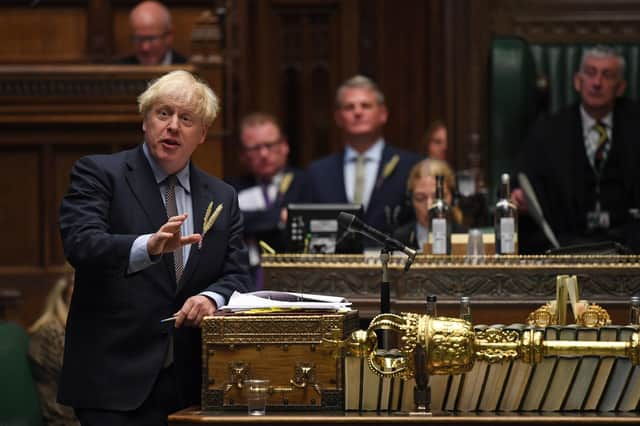Anger after loophole allows alcohol at Westminster after 10pm curfew


Pubs, bars and restaurants must close in England at 10pm under Boris Johnson's coronavirus rules, but there appeared to be an early exemption for drinkers in one establishment - Parliament.
It had emerged the bars and restaurants frequented by MPs and Lords in the Palace of Westminster had been exempt from the regulations throughout last week.
Advertisement
Hide AdAdvertisement
Hide AdMPs had reacted with fury this morning after it emerged venues on the Westminster estate would not have to follow the normal rules for bars as they are considered "workplace canteens".
But in a statement issued this morning, a Parliament spokesperson confirmed: “Alcohol will not be sold after 10pm anywhere on the parliamentary estate.”
The regulations announced by the Prime Minister last week include exemptions for cafes at hospitals, care homes and schools, as well as those providing food to the homeless.
It also says that "workplace canteens may remain open where there is no practical alternative for staff at that workplace to obtain food".
In the centre of London there are relatively few shops surrounding Parliament, particularly late at night, and politicians and staff tend to eat on site.
Health minister Helen Whately said she had been unaware that the curfew did not apply to Parliament and seemed unimpressed.
"We in Parliament shouldn't be sitting round late at night drinking. We have got a job to do when we are there," she told BBC Radio 4's Today programme.
Senior Conservative backbencher Steve Baker was also critical and suggested it would be changed.
Advertisement
Hide AdAdvertisement
Hide Ad"This surely will not last the day, and rightly so," he said.
The curfew that came into force on Thursday has proved controversial, with businesses warning their profitability will be jeopardised and police struggling to disperse large crowds forming after the deadline on Saturday night.
Greater Manchester mayor Andy Burnham has also warned it may be doing "more harm than good", with people piling on to public transport and queuing outside shops to buy more alcohol.
The House of Commons said it would be responding for a request to comment later on Monday.
New local lockdowns, further restrictions and tough new fines for failing to self-isolate had come into force across parts of the UK on Monday.
People across England will be legally required to self-isolate from this week if they test positive for coronavirus or are contacted by the test and trace service.
If they do not they risk being hit with new fines starting at £1,000 and increasing up to £10,000 for repeat offenders or serious breaches, the Department of Health and Social Care (DHSC) said.
People who test positive for Covid-19 will also be fined if they knowingly provide false information about close contacts to the test and trace service.The DHSC said that police will check compliance in the highest incidence areas and in high-risk groups based on "local intelligence".